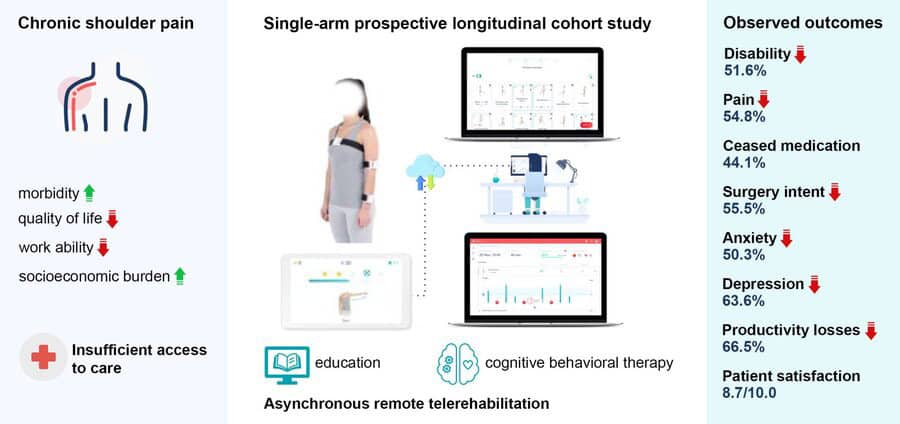Remote care programme for people with chronic shoulder pain proven to clinically significantly improve all health-related outcomes

A US study looking at whether a digital rehabilitation programme for people with chronic shoulder pain is effective has been shown to clinically significantly improve all health-related outcomes.
Entitled ‘Asynchronous and Tailored Digital Rehabilitation of Chronic Shoulder Pain: A Prospective Longitudinal Cohort Study’, the study was published in Dove Press.
The study was carried out as chronic shoulder pain (SP) is a prevalent problem in the US that causes significant morbidity, decreases quality of life, and impairs work ability. The study sought to find out whether digital solutions could improve accessibility to chronic SP treatments to increase convenience, improve outcomes, and reduce healthcare-related costs.
Adults suffering from chronic SP, spanning across 43 states in the United States of America (USA), were invited to apply to SWORD Health’s digital MSK care programme through a dedicated website. 234 patients completed the 12-week digital care programme.
The primary study outcome was to see whether patients’ disabilities and/or symptoms had improved over the 12-week period. Secondary outcomes were whether there was a change in pain, intention to undergo surgery, anxiety, depression, work productivity, and engagement.
The digital rehabilitation programme consisted of therapeutic exercise and education. After enrolling, each participant was assigned a personal trainer who developed a tailored programme to suit the individual’s needs.
Patients performed exercise sessions independently using a medical device consisting of a tablet with a pre-installed app (with instructional videos) and wearable motion-tracking sensors. Motion trackers were placed using straps on the chest, upper arm, and wrist to digitise motion and provide real-time biofeedback during exercise.
Personal trainers remotely monitored participants’ performance and made adjustments, when necessary, through a web-based portal. Two-way communication was performed through a secure chat within a dedicated smartphone app (SWORD health app) or call. At least one touchpoint per week and one video call every four weeks were ensured.
Participants were asked to perform at least three exercise sessions per week for 12 weeks, although early discharge was possible depending on personal trainer assessment.
The educational component was delivered through the app, including educational articles and interactive modules for condition management. This programme taught participants about active coping skills, pain reconceptualisation, and mindfulness.
In line with the primary outcome of the study, by the end of the digital care programme, results were “clinically significant”, with a mean reduction of 51.6 percent in disability and symptom severity.
Marked reductions were also observed in all secondary outcomes, the study showed, with over half of the participants reporting a change in pain, two-thirds having higher work productivity, 63.6 percent having reduced depression, and higher engagement was associated with higher improvements in disability.
Mean patient satisfaction score was 8.7/10.
In conclusion, high completion and engagement rates were observed, which were associated with clinically significant improvement in all health-related outcomes, as well as marked productivity recovery. These promising results support the potential of digital modalities to address the global “burden” of chronic musculoskeletal pain, the study says.

